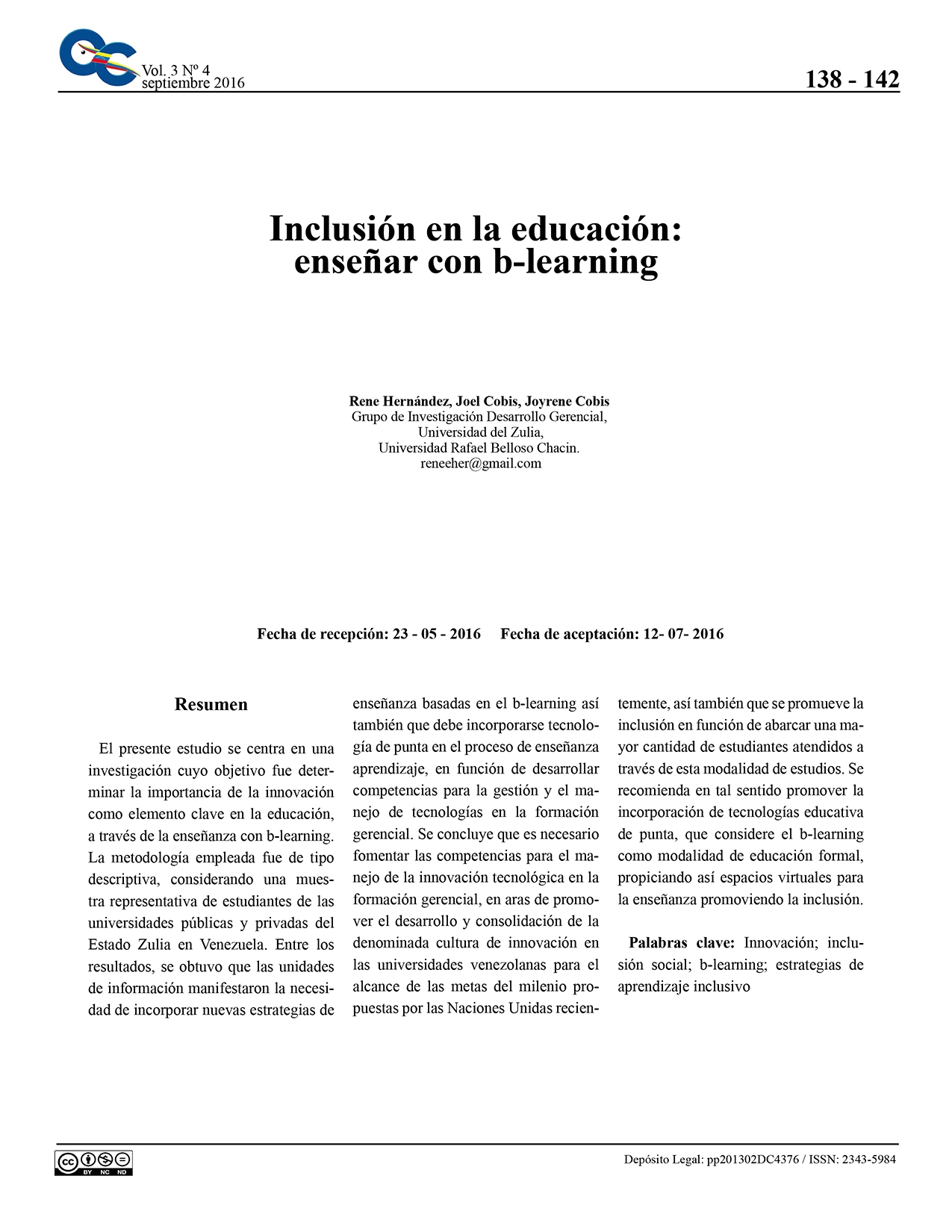Inclusion in education: teaching with b-learning
Keywords:
Innovation, social inclusion, b-learning, inclusive learning strategiesAbstract
The present study focuses on a research whose objective was to determine the importance of innovation as a key element in education, through teaching with b-learning. The methodology used was descriptive, considering a representative sample of students from the public and private universities of Zulia State in Venezuela. Among the results, it was obtained that the information units expressed the need to incorporate new teaching strategies based on b-learning, and also that state-of-the-art technology should be incorporated into the teaching-learning process, in order to develop competencies for the management and Management of technologies in managerial training.It is concluded that it is necessary to promote competencies for the management of technological innovation in management training, in order to promote the development and consolidation of the so-called culture of innovation in Venezuelan universities for the achievement of the Millennium Development Goals proposed by the Nations. United recently, as well as promoting inclusion in order to cover a greater number of students served through this type of studies. It is recommended in this sense to promote the incorporation of state-of-the-art educational technologies, which considers b-learning as a formal education modality, thus promoting virtual spaces for teaching by promoting inclusion.
Downloads
References
Bijker D.(2000). Lo fundamental y lo Mas Efectivo acerca del Cambio. Editorial Mc. Graw Hill. España.
Cadena, Waissbluth y Solleiro (2000). Lineamientos Gerenciales para el Siglo XXI. www.microsoft.com
Castells, M. (1998). Globalización, tecnología, trabajo, empleo y empresa [Electronic Version]. La Factoria. Retrieved Octubre 1998 from www.lafactoriaweb.com/articulos/castells7.htm.
Davila Urrieztieta, S. C., Rojas Vera, Luis Rodolfo (2000). Organización Virtual, Identidad y Gerencia. Telos, 2(1), 93-106. Fernández M.(2003) Modelo de Comportamiento de laOrganización Virtual: Una aplicación Empírica a los sistemas de Franquicia. Tesis doctoral. Universidad de las Palmas de la Gran Canaria. España.
Libro Verde de la Innovación de la Comisión Europea (2005) Kuczmarski (1997) Innovación: estrategias de liderazgo para lograr la ventaja competitiva. Mc Graw Hill. Colombia.
Rojas, L. R., Elizabeth, A. C., Miguel, M., Ramón, R., Ofelia, L. C. C., Efrain, D., et al. (1999). Comunicación, Gerencia y Futuro: Una interpretación posmoderna. Revista Venezolana de Gerencia, 51-69.
Sánchez y Vega (2008). El Control de gestión en la Educación Virtual Universitaria. Revista Compendium Nro.20. Universidad Centro Occidental Lisadro Alvarado (UCLA). Barquisimeto, Venezuela.

Downloads
Published
How to Cite
Issue
Section
License

This work is licensed under a Creative Commons Attribution-NoDerivatives 4.0 International License.







